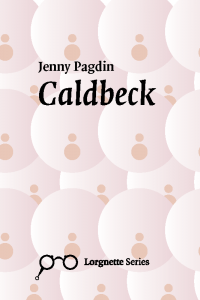Pagdin’s pamphlet, Caldbeck presents poems which are unflinching in focus, and confidently varied in form, as she explores her experience of sudden postnatal psychosis. The poems are thoughtfully arranged to trace the emotional and physical demands of her experiences from early concerns for the health of her unborn child, through to her time in, and beyond Caldbeck psychiatric ward.
The pamphlet begins with a ‘Definition of Love’. Compressed meaning is introduced in the opening poem through a reference to related Old English words for ‘leave’ and ‘lief’, and notions of what is left, abandoned or desired run through the collection. This is followed by the first definition of the ‘Verbal Noun: something known by its actions’: a significant first definition, given the lack of agency and control Pagdin later recounts. Within a few lines we have: ‘the press of breath against a diver’s chest…’. The image is unexpected, and Pagdin moves deftly from lighter, airier images to concluding lines of love like ‘bulbs at night…warm and sure; /rubbed roots which intertwine in earth.’ After this earthy reassurance, she concludes with a sharp caesura and ‘Anonym: heartache.’ The controlled lineation and language keep the poem clear of sentimentality, and this sets the tone for the pamphlet.
Pagdin presents the dislocating nature of her experience through imagery, but also through the lens she offers in the centrally placed ‘The Radio Times’, where she presents a series of distortions, a world in which sounds ‘Cannot be switched off’, and ‘wedding rings are 50p’: everything is too intense; nothing has real value. The facing page contains two assured, tautly one-line poems which mirror each other, conveying the alienating, disabling nature of the psychosis.
Pagdin emerges from her journey with a haiku in praise of Japanese pots which are ‘more valuable cracked.’ The concluding ‘A Definition of Hope’ contrasts earlier images: from the heavier, brutal sense of hopelessness in ‘Crista’, where she states that by the fourth week she was ‘Finally broken – as a horse is broken in—‘ to the fragile birth of a butterfly with ‘ its wings still budded and moist’. The details are raw and precise, and hope shimmers uncertain, juxtaposed against ‘Antonym: nothing.’ It is a fitting, sober end-note for a pamphlet which explores a devastating experience with grace, and with tempered, spare diction.
On Whom the Rain Comes Down
Title from Thomas Hardy’s ‘An Autumn Rain-Scene’
People do say never to touch a tent
that’s heavy with water;
I barely even knew a woman could
get ill and hurt her child.
They said our baby could have Downs,
for six months our odds were penciled on the wardrobe,
while my auntie, cousins, friends,
succumbed to cancers, fraud or death.
They said our baby might have infantile hypotonia,
then he fainted and wouldn’t come round,
I was sick and fainted and was sick, sick, sick
and still it rained down, crosshatching the sky.
Jenny Pagdin studied BA English at Oxford University and MA Creative Writing at the University of East Anglia. She lives with her husband and son in Norfolk where she works as a charity fundraiser. Her first pamphlet, Caldbeck, with Eyewear Publishing, was shortlisted for the Mslexia pamphlet competition (2017) and selected by the Poetry Book Society (2018). She won the Café Writers Norfolk prize 2018.
You can order your copy of Caldbeck by Jenny Padgin, published by Eyewear, here: https://www.poetrybooks.co.uk/products/caldbeck-by-jenny-pagdin

